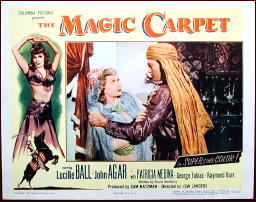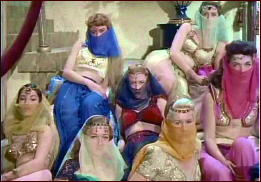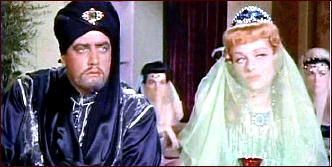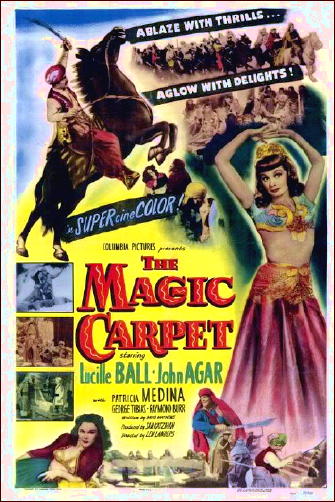Sat 14 Aug 2010
A Movie Review by David L. Vineyard: THE MAGIC CARPET (1951).
Posted by Steve under Action Adventure movies , Reviews[7] Comments
THE MAGIC CARPET. Columbia Pictures, 1951. Lucille Ball, John Agar, Patricia Medina, Raymond Burr, Gregory Gaye, George Tobias, Rick Vallin. Directed by Lew Landers.

Lucille Ball had to be gnashing at the bit in this low budget Arabian Nights fare with John Agar’s flat Midwestern monotone marking him as the most unlikely Arabian swashbuckler since Oklahoma cowboy Dale Robertson and Paul Henreid.
Ball’s career had begun as a chorus girl at MGM (if you look quickly you can spot her wearing little but long blonde hair in an early Eddie Cantor outing Roman Scandals), with a long but steady climb up to stardom marked by mostly minor films with a few good roles in major fare like Stage Door (with Katherine Hepburn and Ginger Rogers), a brief period of popularity in films like Du Barry Was A Lady, The Big Street, and Easy To Wed (in the Jean Harlow role from Libeled Lady), and even credit for discovering one of MGM’s greatest stars — Van Johnson.
Even after leaving MGM for RKO she enjoyed some success, and just one year before this had scored well with Bob Hope in Fancy Pants, a technicolor remake of Ruggles of Redgap.
But in 1951 she was limited to doing films like Magic Carpet with leads like John Agar — a long fall from the likes of William Holden, Gene Kelly, and co-starring with Spencer Tracy and Katherine Hepburn (Without Love) and films like The Dark Corner, Lured, Miss Grant Takes Richmond, and Sorrowful Jones.
Luckily for her she had options. My Favorite Husband, her long running hit radio series with Richard Denning was being considered for television, and she and Cuban band leader husband Desi Arnaz had plans for that medium …
The Magic Carpet is Arabian Nights by rote. The Caliph is over thrown by evil Ali (Gabriel Gaye) and his henchman Boreg al Buzzar (Raymond Burr), who murder the Caliph and his wife, but not before she places their infant son on the magic carpet of the title, which carries him to safety and the sanctuary of a local physician, her uncle.

The true Caliph grows up to be Dr. Ramoth (John Agar), who is also the bandit leader, the Scarlet Falcon, bane of the Caliph Ali and his Grand Vizer Boreg and their corrupt reign.
In something of a twist, Lucille Ball is not the heroine of the film. That doubtful honor goes to Patricia Medina, who was virtually a staple in this sort of thing — and has here one of the worst dance numbers in the history of Arabian Nights nonsense. Lucy is Princess Narah, the evil Ali’s willful and sexually predatory sister, while Medina is Lida, the sister of Razi (George Tobias — and you have to wonder at the genetics that produced those progeny), the Scarlet Falcon’s right hand man.
Meanwhile Dr. Ramoth inveigles his way into the royal palace as court physician where he is a great hit with Narah and the Harem, and when his uncle is murdered by suspicious Boreg learns of his own royal birth and the magic carpet, excuse for some terrible special effects and mediocre mat paintings.
I’d like to say Lucy does her best as the semi evil Narah, but frankly both she and Medina play their respective roles like a pair of feuding strippers with Lucy’s attempts to seduce poor wooden Agar almost as funny as some of her routines on I Love Lucy, if not intentionally.
Substitute a G-string and pasties for their Arabian finery and move the plot backstage at a burlesque theater and you’d never notice the difference. If this film was any flatter, it wouldn’t even be in two dimensions.

These things depend on the good will of the audience and the ability of the actors to make us want to believe in the silly but colorful goings on. In the hands of a Cornell Wilde, Jon Hall, or Jeff Chandler and a leading lady like Maria Montez, Maureen O’Hara, Rhonda Fleming, or even the unlikely Virginia Mayo the whole nonsensical thing can be great fun. Here no one seems even willing to try. It doesn’t even rise to the level of cynical exploitation.
Lucille Ball didn’t make another film until The Long Long Trailer in 1953, an attempt to cash in on the success of I Love Lucy. She did a few films in later years, notably with Bob Hope and Henry Fonda, and bowing out from film finally with the hideous film version of the Broadway musical Mame.
Her legendary television career and the success of Desilu studios more than made up for it, but you have to think she would have preferred to go out of her big screen career on a better note.
I’m usually forgiving of these, and even will admit to a taste for the better ones, but this has worse production values than an episode of I Dream of Jeanie, and performances that would have to be upgraded to reach the level of a burlesque comedy routine.
Still, Raymond Burr at his heaviest and wielding a scimitar is a sight you don’t often see (“This time Doctor, you must tend to a man and not on the ladies of the Harem!”), and the fact that Lucy was pregnant might somewhat mitigate her flat performance — this script would have been enough to give anyone morning sickness:
Ramoth: I wouldn’t if she were a princess.
Ramoth regains his throne, Lucy and the evil Ali get their comeuppance, and Ramoth and Lida get a final clench on the magic carpet:
Ramoth: It’s not easy to embrace a tigress.
Lida: From now on you see a lamb.
Ah, well, it could be worse. Though I’m not exactly sure how.
Editorial Comment: The whole movie appears to be available on YouTube. This link will take you to some excerpts, so that you may get an overall impression of the film, should you care to continue.

August 15th, 2010 at 6:47 am
It sounds godawful. What genius cast John Agar in this?
Of course, he went on to ‘star’ in some of the worst cheapie horror & sf movies of the 1960s: Zontar, Curse of the Swamp Creature, Women of the Prehistoric Planet (which my wife called Planet of the Prehistoric Women).
August 15th, 2010 at 9:56 am
Badly as Agar is cast, he, at least, makes the effort (along with Burr and Tobias who work as hard as if it were a better film). What you will notice is how bad and flat Lucy and Medina are. If ever a performance was called in …
Lucy seems about half sullen, and Medina, as I said, reads her lines with all the skill of a stripper in a burlesque comedy skit. Neither of them seems happy — Lucy to be in the film, and Medina to be third billed after Lucy and Agar.
Lucy was pregnant and had to resent being in this, so she may deserve a minor break, but that expression on her face in the picture above with Burr about sums up her performance.
And it isn’t as if Lucy hadn’t played some tough less than nice girls before. She’s great in THE BIG STREET, and steals the show in the Harlow role in EASY TO WED. This one though is strictly a case of show up, hit your marks, say your lines, and go home — which is the best that can be said about her performance. Medina doesn’t even rise to that standard, her big dance number is the most anemic Middle Eastern dance I have ever seen.
The belly dancer at the local Greek Orthodox Church international foods fair was more sensual. A good deal more sensual.
Poor Agar at least was making the effort.
August 15th, 2010 at 10:24 pm
Wow! I never knew this film existed! Fascinating stuff. I’ve never found Lucy a sex kitten, though she wasn’t bad in a couple noirish films as I recall, Dark Corner and Lured, I think.
August 16th, 2010 at 1:48 pm
Curt
It’s not exactly noir, but THE BIG STREET is very much in a noir mode with Lucy a thoughtless femme fatale who exploits Henry Fonda’s adoring bus boy. It’s based on a COLLIERS story by Damon Runyon called ‘Little Pinks’ but not comic in the usual Runyon mode. A bit treacly, but Lucy is impressive in a heartless role.
It’s an odd film and odd roles for Fonda and Lucy, but they both give excellent performances.
Lucy is also good in the mystery film (proto noir) TWELVE CROWDED HOURS, a fast paced mystery thriller with Richard Dix with a screen story by Peter Ruric — BLACK MASK’s Paul Cain.
She is also good in Jean Negluesco’s TWO SMART PEOPLE as a con woman caught between charming crook John Hodiak and good cop Lloyd Nolan with a screenplay co-written by Leslie Charteris.
In MISS GRANT TAKES RICHMOND she’s William Holden’s screwy secretary who gets involved with crooks.
And she’s the romantic lead opposite Chester Morris in John Farrow’s FIVE CAME BACK, one of the best B movies ever made with a screenplay by Dalton Trumbo and Nathaniel West (and I’ve read an uncredited James M. Cain).
August 16th, 2010 at 10:34 pm
It may be heretical in some quarters, perhaps, but I have the feeling that readers of this blog love Lucy more for her 1940s movies than they love her as Lucy Ricardo.
I know I do.
Maybe even Lucy in THE MAGIC CARPET, but then again, maybe not.
August 16th, 2010 at 11:03 pm
I watched a little of the Magic Carpet on youtube and, yup, it’s bad. I have to admit I did laugh at Burr’s “the harem flourishes with sickness lately” line. This film really needed Bob Hope and outright comedy though. Lucy makes about the most improbable seductive Arab princess one could imagine (I kept expecting Ethel to turn up and that we’d learn this is all part of Lucy’s latest attempt to get in one of Ricky’s shows). And Agar is so out of place it’s painful.
I loved the commitment to realism as exemplified by the clamshell swimming pool. Agar was a bit flabby there, but then this isn’t a Tarzan film! I recall seeing him in a western with Henry Fonda and Shirley Temple, I believe, where he wasn’t bad, but he’s pretty dire here.
And I was pretty sure that was “Abnuh!” from Bewitched in there. He’s more likely to have seen Queens than any queens, I think.
I’ll have to try to track down those other forties Lucy films. I liked Dark Corner and Lured, she was well-suited to girl friday mystery roles. Grant Takes Richmond I’d heard of, but that’s not on DVD.
December 31st, 2016 at 6:56 pm
Actually, Lucille Ball was given this film as a “lease breaker”. She was cast in Cecil B. DeMille’s Best Picture winner “The Greatest Show on Earth.” She still had one more film on her contract and she tried to get out of it. Harry Cohn said no. As punishment, he sent her this script. If she said no, she was out of her contract, but seen as difficult and without her 85K salary. So to get around it, she said yes, shocking Cohn.
I believe if you knew that, you wouldn’t be so critical in the scale of her leading men or an indicator that her career was going downhill. This was a business move designed to not let the studios control her. She then got pregnant with daughter Lucie and had to drop out of the DeMille project (with the role going to Gloria Grahame).
She made this knowing she was following this up with the DeMille picture which would have saved her good reputation as a reputable actress.